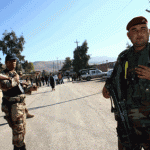Iraq, Oil, And The Global Economy
J une began with a sense of calm and quiet optimism.
une began with a sense of calm and quiet optimism.
Stocks were on the upswing as the S&P 500 hit a new all-time high of 1,955 on June 9th.
Investor sentiment was becoming more bullish. The AAII Investor Sentiment Survey showed bullish sentiment reaching its highest point of the year during the same week.
And at the same time, volatility was low. The VIX fell to its lowest level since before the financial crisis.
But it didn’t last long…
The calm was broken when members of ISIS, a group linked to Al-Qaeda, began taking over Iraq. The Islamist militants are advancing across the country uncontested and taking over control of one city after another.
Needless to say, this is disturbing on many levels.
The ten years of war our men and women in the armed services spent securing the region seems to be coming undone virtually overnight.
In short, there’s now an Islamic State controlled by a splinter of al-Qaeda in the heart of the Middle East.
The destabilization of an already unstable region has the potential to expand across the Middle East.
As it relates to the global economy, the situation has a direct impact on the crude oil market. Iraq is the second largest OPEC oil producer.
If ISIS cuts off Iraq’s oil exports, we could see crude oil price spike by $20 or more per barrel very quickly.
Here’s the thing…
Crude oil is hovering around $105 per barrel. But it’s widely believed that if oil prices climb to over $130 per barrel, it will damage the global economy.
Obviously this situation has the potential to have a far reaching impact.
Don’t forget that the stock market’s advance has been led by an uptick in cyclical stocks. These stocks need economic activity to accelerate in order to generate the higher revenues and earnings necessary for them to justify a higher stock price.
But if oil prices climb much higher, the global economy will likely stall or even tumble into a recession. And that will have a direct impact on cyclical stocks and the ETFs that hold them.
For now, crude oil prices are being held in check by hopes that the situation won’t spiral out of control and cause a major disruption to world oil supplies. But we have seen oil prices reach their highest levels in months.
As a result, we have seen energy ETFs outperform over the last few weeks while every other sector has pulled back.
The way I see it, this situation will be contained before it impacts the more important oil fields in southern Iraq. This situation will end up having a bigger impact on investor psychology than any real impact on the global economy.
In short, use this pullback from the recent highs that was triggered by the violence in Iraq to initiate new positions or add to your existing ones.
Good Investing,
Corey Williams
Category: ETFs, What's Going On?




